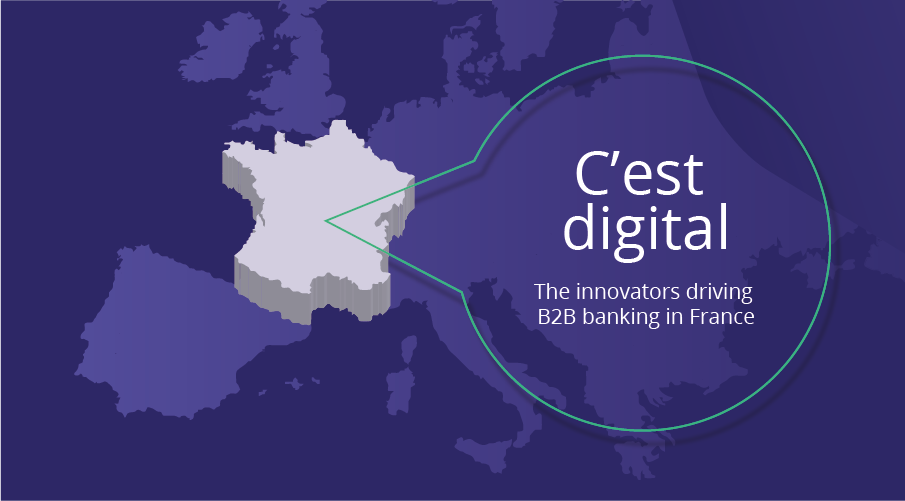November 12, 2020 | 5 min read
C’est digital: meet France’s B2B banking innovators



With its highly-organised financial ecosystem, the French market has set an impressive standard for business-to-consumer (B2C) banking innovation. However, attention is now turning to the business-to-business (B2B) banking space where new entrants seek to help businesses do banking differently — and better. To find out more, we interviewed Jean-François Delorme of tech specialist DXC Technology; Rodolphe Ardant, founder and CEO of financial software provider Spendesk; and Adrien Touati, founder of the online bank for business manager.one. We asked them to reflect on current opportunities for collaboration between fintechs and banks, and how their respective businesses were helping French small to medium-sized enterprises (SME)s. Here’s what they had to say:
What opportunities are there for B2B banking and other fintech providers in France?
Jean-François: It’s undeniable that recent trends are certainly in B2B and B2B2B. For example, a really interesting development is with banks who are starting to offer white label marketplaces to their business customers. It’s very much an attempt at stealing the clothes of the fintech community and something to watch closely. Imagine a rural bank with its countryside focus for its agricultural business customers.
Rodolphe: Players in the B2C space have developed some really slick and smart propositions and it’s now time for B2B to catch up. The banks cannot adapt fast enough, though, as they are reliant on old systems that make innovation tough. This means there are opportunities for businesses like Spendesk who have no desire to be a bank, but is a technological layer between banks and businesses’ enterprise resource planning systems. It’s about providing accurate real-time data and analytics along with fully automated and digital processes that solve the current friction-laden processes relating to business spending and procurement.
Adrien: It might be an incredibly challenging time in the B2C digital banking sector, but for B2B there is the space to accommodate new entrants. A factor in the growth of fintechs supporting B2B banking is inevitably interchange — which is significantly higher for corporate cards in France and across Europe, and therefore factors in the unit economics of the programme. Additionally, the business sector is really beginning to understand the benefits of modern card programmes as a time-saving and fraud prevention tool, which is edging us closer to a predominantly mobile banking world.
What is the relationship between banks and the fintech community like in France?
Jean-François: In France, we live in a very organised ecosystem where we have iterative thinking and a long tradition of interbank cooperation. Players tend not to try to be the Barclaycard of payments and do everything, but rather work together collaboratively, and this has been the case for the last 20-30 years. Banks are ready to cooperate but still want to control.
Adrien: From an entrepreneur’s perspective, SMEs are likely to experience a range of frustrations with traditional banks in France. It often feels like the system run by the incumbents works against start-ups in terms of the onerous nature of opening business bank accounts through a lack of transparency around pricing and the time it takes to get a decision. Fintechs are challenging this, and whilst incumbents cooperate between themselves, there’s a long way to go when it comes to working with modern innovators. We have had many conversations with traditional players, and the timescale for banking transformation in France is simply too slow. The right approach is to focus on growing your own customers rather than trying to convince others. The big banks understand transformation, but at an organisational level, this kind of change is very difficult to progress.
Rodolphe: I think the incumbents are now making an effort but they cannot adapt fast enough, though, as they are reliant on old systems that make innovation tough. As has been said, innovation tends to start in the B2C banking space before it’s reflected in the B2B banking space. And with the French government recently simplifying things to ensure talent can get capital and get regulated, I think the banks will feel the need to work with fintechs.
How are you helping businesses — particularly SMEs — gain access to a different type of banking experience?
Adrien: Virtual card products are really taking off and are becoming increasingly important for corporates, thanks to innovations such as the ability to provide employees with reloadable cards that deliver direct accounts reconciliation. The other key trend is real time. Digital has given businesses unrivaled certainty and control thanks to real-time spending authorisations and data insights.
Rodolphe: Businesses really benefit from tools which empower finance teams to decentralise spending across the company without losing control. We’re helping to do this by giving accounts departments access to real-time spending data when they need it, and providing staff with the right level of control that is compliant with company policy. The key is that our customers own the process, not Spendesk. Also, following France’s ecosystem culture, we’re working on ensuring financial data from Spendesk can be sent to accounting software packages like Xero and NetSuite, and these integrations are coming soon.
Jean-François: As a consultancy team, we’re very much looking at what the likes of Mooncard and manager.one are doing with corporate and expense cards, and how they’re using data aggregation to excellent effect. Swan also looks very interesting. They recently launched as a banking-as-a-service (BAAS) model but they have a banking license that they allow others to leverage, so it’s not purely a tech play; they take on the regulatory liability too. Through Swans APIs you can activate services, and you do not need to be an agent to use their services. Finally, if I were to set up a business, I would look at prepaid vouchers linked to specific use cases, such as luncheon vouchers across the E.U., in addition to other social aids. There is a prospect market amongst micro-SMEs like personal tutors, housekeepers, and other similar roles.
*The views and opinions expressed in this blog are those of the respective respondents and do not necessarily reflect the views or opinions of Marqeta.
To continue exploring fintech innovation around the globe, read: Hola innovation: how Spain is becoming a European fintech hub.
